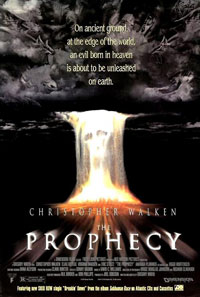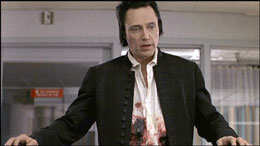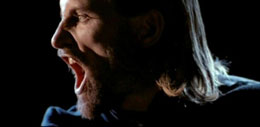Some movies are a pure exercise in precariousness, veering dangerously close to cheese in the name of high stakes experimentation.1995’s The Prophecy, written and directed by Gregory Wilden, starring Christopher Walken, Elias Koteas, and Virginia Madsen, with substantial supporting work from people like Eric Stoltz and Viggo Mortensen, is such a movie.
 It tells the story of renegade angels waging a second war in heaven in opposition to God’s favoritism for the human race, mostly focusing on the war’s ramifications on earth. Delving into the territory of possession, exorcism, and obscure Christian theology—mostly fictional—the film places Walken as the archangel Gabriel at the forefront of the conflict, and Koteas as Thomas Dagget, a former Roman Catholic seminarian turned LAPD detective caught up in the ensuing mayhem in the American southwest.
It tells the story of renegade angels waging a second war in heaven in opposition to God’s favoritism for the human race, mostly focusing on the war’s ramifications on earth. Delving into the territory of possession, exorcism, and obscure Christian theology—mostly fictional—the film places Walken as the archangel Gabriel at the forefront of the conflict, and Koteas as Thomas Dagget, a former Roman Catholic seminarian turned LAPD detective caught up in the ensuing mayhem in the American southwest.
Gabriel comes to earth to steal the soul of a recently deceased Korean War vet accused of various war crimes, including unsanctioned executions and cannibalism. His goal is to use this “dark spirit” as an asset in the heavenly war, explained later to be because angels know less of warfare than human beings, with the intervention of Colonel Hawthorne’s homegrown malevolence tipping the scale in their favor.
Exposition with reasoning like that would normally induce a serious wave of incredulity in me, but in all fairness, there are just as many glaringly contradictory and inexplicable passages in existing scripture. So let’s not nitpick for the sake of entertainment.
Where the film succeeds is in strong performances and undeniably creepy atmosphere that at times is genuinely upsetting. And discounting some of the aforementioned gaps in logic in part of its premise, certain plot details are really satisfying, such as a coroner’s examination of a dead angel (in recently transmogrified human form) that uncovers its biological composition to be similar to that of an aborted fetus, as well as technically hermaphroditic. That actually makes a lot of sense to me.
 As Gabriel, Walken is pretty amazing. He’s pale, joyless, draped in black garments, and sets adversarial angels on fire by force of will. In a chilling scene late in the film, he takes credit for instances of biblical genocide, implying he’s the Angel of Death. He brings suicides back from the dead to do his bidding as undead slaves, the first and primary of which is Adam Goldberg as Jerry. Their dynamic provides much of the film’s comic relief.
As Gabriel, Walken is pretty amazing. He’s pale, joyless, draped in black garments, and sets adversarial angels on fire by force of will. In a chilling scene late in the film, he takes credit for instances of biblical genocide, implying he’s the Angel of Death. He brings suicides back from the dead to do his bidding as undead slaves, the first and primary of which is Adam Goldberg as Jerry. Their dynamic provides much of the film’s comic relief.
But out of every performance, one stands head and shoulders above the rest, and that’s Viggo Mortensen as Lucifer. In a few scenes, most of which he spends perched on a boulder, he all but steals the show. Bearded, hair slicked back, he barks exposition in solemn detachment, and is terrifying in a way no other screen depiction of the devil has ever been (De Niro and Pacino‘s takes can’t help but fall short, and that’s clearly saying something).
 Towards the end of the film, as Gabriel’s final arrival and inevitable confrontation draws near, Satan sneaks up on the detective in a moment of weakness and wraps his arms around him. Speaking directly into his ear at a volume just above a whisper, he tells him how he used to watch him pray at bedtime when he was a little boy, insinuating a demonic presence and power of observation rivaling that of the Almighty. It’s some unnerving, spooky shit.
Towards the end of the film, as Gabriel’s final arrival and inevitable confrontation draws near, Satan sneaks up on the detective in a moment of weakness and wraps his arms around him. Speaking directly into his ear at a volume just above a whisper, he tells him how he used to watch him pray at bedtime when he was a little boy, insinuating a demonic presence and power of observation rivaling that of the Almighty. It’s some unnerving, spooky shit.
Never quite attaining greatness, The Prophecy delivers plenty of genuinely frightening moments, a dreary, suggestive eeriness in tone that never lets up, and a lot of really juicy performances. The possession aspect is handled a little clumsily, but the payoff of a Native American ritual supplanting a traditional Catholic exorcism is worth enduring its setup.
Walken is fantastic, Koteas and Madsen are serviceable and convincing, and Mortensen is out of this world. Watching him pluck the petals off a yellow rose and devour its crunchy interior is something you won’t soon forget. I wonder what ever happened to that guy.




{ 1 comment }
Viggo’s Lucifer is, without a doubt, the best performance of any Satan, Lucifer, the Devil (as Pacino’s Satan said in, ‘The Devil’s Advocate,’ “I have so many names…”), Mephistopholes, etc., in film history. Despite a mere few minutes of screen time, the film would’ve been MUCH less appealing without HIM in that particular character. Not so much scary as…philosophically & theologically accurate given the film’s premise. Fortunately, the writer/director didn’t overuse the Viggo Mortensen character of Lucifer. His relatively short screen time would have diluted the strength of his performance, perhaps irretrievably. I just saw the film again after many years on Cinemax.
Comments on this entry are closed.